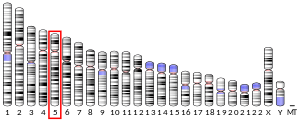ERAP2
Endoplasmic reticulum aminopeptidase 2 is a protein that in humans is encoded by the ERAP2 gene.[3]
Function
Aminopeptidases hydrolyze N-terminal amino acids of proteins or peptide substrates. Major histocompatibility complex (MHC) class I molecules rely on aminopeptidases such as ERAP1 and LRAP to trim precursors to antigenic peptides in the endoplasmic reticulum (ER) following cleavage in the cytoplasm by tripeptidyl peptidase II (TPP2).[4]
gollark: Yes, twice.
gollark: This may be fixed in minoteaur-py.
gollark: Those are handled by more accursed code.
gollark: Nevertheless, this "works".
gollark: It removes other formatting.
References
- GRCh38: Ensembl release 89: ENSG00000164308 - Ensembl, May 2017
- "Human PubMed Reference:". National Center for Biotechnology Information, U.S. National Library of Medicine.
- "Entrez Gene: Endoplasmic reticulum amino peptidase 2".
- Tanioka T, Hattori A, Masuda S, Nomura Y, Nakayama H, Mizutani S, Tsujimoto M (Aug 2003). "Human leukocyte-derived arginine aminopeptidase. The third member of the oxytocinase subfamily of aminopeptidases". The Journal of Biological Chemistry. 278 (34): 32275–83. doi:10.1074/jbc.M305076200. PMID 12799365.
Further reading
- Xu XR, Huang J, Xu ZG, Qian BZ, Zhu ZD, Yan Q, Cai T, Zhang X, Xiao HS, Qu J, Liu F, Huang QH, Cheng ZH, Li NG, Du JJ, Hu W, Shen KT, Lu G, Fu G, Zhong M, Xu SH, Gu WY, Huang W, Zhao XT, Hu GX, Gu JR, Chen Z, Han ZG (Dec 2001). "Insight into hepatocellular carcinogenesis at transcriptome level by comparing gene expression profiles of hepatocellular carcinoma with those of corresponding noncancerous liver". Proceedings of the National Academy of Sciences of the United States of America. 98 (26): 15089–15094. doi:10.1073/pnas.241522398. PMC 64988. PMID 11752456.
- Hill LD, Hilliard DD, York TP, Srinivas S, Kusanovic JP, Gomez R, Elovitz MA, Romero R, Strauss JF. "Fetal ERAP2 variation is associated with preeclampsia in African Americans in a case-control study". BMC Medical Genetics. 12: 64. doi:10.1186/1471-2350-12-64. PMC 3103419. PMID 21569342.
- Ascher DB, Polekhina G, Parker MW (Apr 2012). "Crystallization and preliminary X-ray diffraction analysis of human endoplasmic reticulum aminopeptidase 2". Acta Crystallographica Section F. 68 (Pt 4): 468–471. doi:10.1107/S1744309112006963. PMC 3325822. PMID 22505422.
- Kamphausen E, Kellert C, Abbas T, Akkad N, Tenzer S, Pawelec G, Schild H, van Endert P, Seliger B (Aug 2010). "Distinct molecular mechanisms leading to deficient expression of ER-resident aminopeptidases in melanoma". Cancer Immunology, Immunotherapy. 59 (8): 1273–84. doi:10.1007/s00262-010-0856-7. PMID 20419298.
- Stratikos E, Stern LJ (Oct 2013). "Antigenic peptide trimming by ER aminopeptidases--insights from structural studies". Molecular Immunology. 55 (3–4): 212–219. doi:10.1016/j.molimm.2013.03.002. PMC 3657621. PMID 23545452.
- Bjornsson HT, Albert TJ, Ladd-Acosta CM, Green RD, Rongione MA, Middle CM, Irizarry RA, Broman KW, Feinberg AP (May 2008). "SNP-specific array-based allele-specific expression analysis". Genome Research. 18 (5): 771–779. doi:10.1101/gr.073254.107. PMC 2336807. PMID 18369178.
- Mason CC, Hanson RL, Ossowski V, Bian L, Baier LJ, Krakoff J, Bogardus C. "Bimodal distribution of RNA expression levels in human skeletal muscle tissue". BMC Genomics. 12: 98. doi:10.1186/1471-2164-12-98. PMC 3044673. PMID 21299892.
- Haroon N, Tsui FW, Chiu B, Tsui HW, Inman RD (Sep 2010). "Serum cytokine receptors in ankylosing spondylitis: relationship to inflammatory markers and endoplasmic reticulum aminopeptidase polymorphisms". The Journal of Rheumatology. 37 (9): 1907–10. doi:10.3899/jrheum.100019. PMID 20595269.
- Qu HQ, Marchand L, Fréchette R, Bacot F, Lu Y, Polychronakos C (Mar 2007). "No association of type 1 diabetes with a functional polymorphism of the LRAP gene". Molecular Immunology. 44 (8): 2135–8. doi:10.1016/j.molimm.2006.10.015. PMID 17129607.
This article incorporates text from the United States National Library of Medicine, which is in the public domain.
This article is issued from Wikipedia. The text is licensed under Creative Commons - Attribution - Sharealike. Additional terms may apply for the media files.

